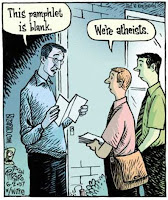The Weekend Australian ran an article on Saturday called, "Churches Unite to Promote Jesus". The article is about the $1.5 million "Jesus - all about life" marketing campaign that is being run in NSW by The Bible Society of NSW. The aim of the campaign is to highlight that Jesus has the answers to even the most complex questions of modern life.
Can Jesus be marketed? Should he be? Hasn't he always been? - some would ask...
I've always thought that Jesus needed to be "mission-ed" (I don't actually think that this is a word)... By that, I mean that I always thought that Jesus needed to be shared with others and understood through caring relationships; through sharing life with others; and through acts of kindness and compassion. When God wanted to do his most important work for the world, he became one of us and moved into the neighbouthood to make a lasting difference. For me, Jesus is not information to be shared, but a relationship with God and an agenda for life to be engaged in. Can a marketing campaing be consistent with this?
It could easily be argued that an important part of the process of understanding and getting to know Jesus is about information. How do I go about understanding who Jesus is and what he is on about? I guess I need some information to know whether I should even bother trying... The aim of this campaign seems to be to get people talking about Jesus at work, at school, with friends etc...
There was an interesting interview on ABC Life Matters with David Willis (Bible Society - NSW) and Sharon Williams (Taurus Marketing) about the campaign they have put together and their thoughts on these kinds of questions. This is followed by another interesting interview on "Christot-ainment" which is worth listening on to.
Maybe there is a place for this kind of marketing alongside mission. Part of the history of the Christian faith has been "proclaiming the word" to others. This might just be one of the ways that this is done in the 21st century. Maybe its okay, as long as it doesn't replace real Jesus-like engagement with the world around us.














